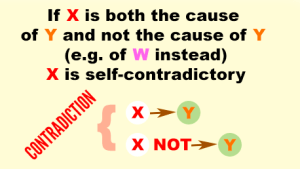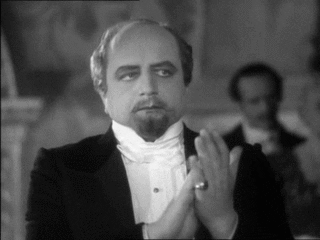Sorry if that is inconvenient or upsetting.
There is no modal category called “causal necessity,” only “logical necessity.”
I have addressed this time and time again.
Necessary causes vs sufficient causes
If someone says that A causes B:
- If A is necessary for B (necessary cause) that means you will never have B if you don't have A. In other words, of one thing is a necessary cause of another, then that means that the outcome can never happen without the cause. However, sometimes the cause occurs without the outcome.
And there is no logical necessity that I choose Pepsi over Coke at time T. End of hard determinism.
Sorry if that is inconvenient or upsetting.
You tend to overlook the distinction between necessary cause and sufficient cause, where ''necessary cause means that ''you will never have B if you don't have A.''
Apply that principle to your own definition of determinism, ''constant conjunction,'' where ''one event is invariably followed by the other''
I hope that helps.
Jebus Christ, we are not talking about necessary or sufficient CAUSES; we are talking about your (imaginary) necessary EFFECTS. The above completely fails to address my point about necessary v. contingent EFFECTS.
Nah, we are talking about determinism, as it is defined. That in relation to free will as compatibilists define it.... at least that is issue.
Your ''(imaginary) necessary EFFECTS'' rationale doesn't work because I made no mention of ''effects.''
Of course you did. You have repeatedly said that every causal effect is a NECESSARY effect. Modal fallacy, post hoc ergo propter hoc, etc.
It has nothing to do with me. The compatibilist gives his definition of determinism as events determined by antecedents, with no realizable altenate actions in any given instance. Only one outcome possible
That is what your own endorsed definition of determinism entails; ''Just what I said it means, and what Hume said it means: “Constant conjunction.” - Pood.
Constant conjunction permits no realizable alternatives to what is conjoined.
It was not said by me, or even implied. You impose your interpretation without regard to what is said, meant or intended.
Now you are dropping your claim that it is NECESSARY that I pick Pepsi over Coke at time T? Because picking Pepsi is an EFFECT of prior CAUSES, no?
Tht
I stick to the given terms and definitions. You try to circumvent them in order to find room for the notion of free will.
Determinism doesn't have 'effects' as such, it is by definition an unbroken web of events, where all events are entailed by initial conditions and how the world works, natural law. determining the evolution of the system.
Oh, so we are back to the Big Bang composing the improv jazz piece? I thought you rejected Jerry Coyne’s claim on that score (so to speak)?
Event B is not the effect of event A, event C the effect of event B, it is the natural progression events, the system evolving as it must. There is no contingency in determinism, the system evolves
So we are back to every effect is a necessary effect, the modal fallacy.
And back to ignoring, so it would seem, that the agent is part of the deterministic process, and so DETERMINES the outcome of a choice in which multiple options are presented by prior antecedent events — an option for choice that rocks rolling down a hill lack, but I guess you think we are rocks rolling down hills, and are back to the thesis that the big bang gave the initial push.
Sorry if that is inconvenient or upsetting.
There is no modal category called “causal necessity,” only “logical necessity.”
I have addressed this time and time again.
Necessary causes vs sufficient causes
If someone says that A causes B:
- If A is necessary for B (necessary cause) that means you will never have B if you don't have A. In other words, of one thing is a necessary cause of another, then that means that the outcome can never happen without the cause. However, sometimes the cause occurs without the outcome.
And there is no logical necessity that I choose Pepsi over Coke at time T. End of hard determinism.
Sorry if that is inconvenient or upsetting.
You tend to overlook the distinction between necessary cause and sufficient cause, where ''necessary cause means that ''you will never have B if you don't have A.''
Apply that principle to your own definition of determinism, ''constant conjunction,'' where ''one event is invariably followed by the other''
I hope that helps.
Jebus Christ, we are not talking about necessary or sufficient CAUSES; we are talking about your (imaginary) necessary EFFECTS. The above completely fails to address my point about necessary v. contingent EFFECTS.
Nah, we are talking about determinism, as it is defined. That in relation to free will as compatibilists define it.... at least that is issue.
Your ''(imaginary) necessary EFFECTS'' rationale doesn't work because I made no mention of ''effects.''
Of course you did. You have repeatedly said that every causal effect is a NECESSARY effect. Modal fallacy, post hoc ergo propter hoc, etc.
The modal fallacy is not mine. It is the compabilist who gives their definition of determinism.
''However, in order for determinism to be true, it must include all events. For example, determinism cannot exclude the effects of natural forces, like volcanoes and tidal waves or a meteor hitting the Earth. Determinism cannot exclude the effects of biological organisms that transform their environments, like tree seedlings changing bare land into a forest. Determinism cannot exclude the effects of deliberate choices, like when the chef prepares me the salad that I chose for lunch.
All of these events, including my choices, were causally necessary from any prior point in time. And they all proceeded without deviation from the Big Bang to this moment.'' - Marvin Edwards.
''Just what I said it means, and what Hume said it means: “Constant conjunction.” - Pood
Jarhyn - A deterministic system is a system in which no randomness is involved in the development of future states of the system.
''Determinism: The world is governed by (or is under the sway of) determinism if and only if, given a specified way things are at a time t, the way things go thereafter is fixed as a matter of natural law.''
A definition that describes events as being fixed or determined by antecedents, which by definition entails the absence of alternate actions in any given instance.
If more than one possibility can happen at any given instance, it's not determinism as the compatibilist defines it to be.
You are the one engaging with modal fallacies.
It was not said by me, or even implied. You impose your interpretation without regard to what is said, meant or intended.
Now you are dropping your claim that it is NECESSARY that I pick Pepsi over Coke at time T? Because picking Pepsi is an EFFECT of prior CAUSES, no?
What exactly did I say? Quote what I said in the context in which I said it. I say that you are playing games.
I stick to the given terms and definitions. You try to circumvent them in order to find room for the notion of free will.
Determinism doesn't have 'effects' as such, it is by definition an unbroken web of events, where all events are entailed by initial conditions and how the world works, natural law. determining the evolution of the system.
Oh, so we are back to the Big Bang composing the improv jazz piece? I thought you rejected Jerry Coyne’s claim on that score (so to speak)?
No, that's your game playing at work. I have explained your fallacy - the excluded middle - where the system must evolve to the point where there are creatures with the capacity to compose music, and not that the 'big bang composed jazz''
You should know by now how determinism is defined by compatibilists.
''The only essential element of determinism is that every event is reliably caused by prior events. This is logically derived from the notion of a world of perfectly reliable cause and effect. Each state of the universe and its events are the necessary result of its prior state and prior events. ("Events" change the state of things.)
Determinism means that events will proceed naturally (as if "fixed as a matter of natural law") and reliably ("without deviation")
All of these events, including my choices, were causally necessary from any prior point in time. And they all proceeded without deviation from the Big Bang to this moment.'' - Marvin Edwards.
Event B is not the effect of event A, event C the effect of event B, it is the natural progression events, the system evolving as it must. There is no contingency in determinism, the system evolves
So we are back to every effect is a necessary effect, the modal fallacy.
No, just how determinism is defined and described by compatibilists, including yourself.
You are the one caught in a modal fallacy where you describe determinism as a system where each event is a matter of constant conjunction, which does not permit multiple possible actions in any given instance, yet deny the very terms of bot yours and the compatibilist definition of determinism.
You like to play it both ways, a modal fallacy, then point the finger at me.
And back to ignoring, so it would seem, that the agent is part of the deterministic process, and so DETERMINES the outcome of a choice in which multiple options are presented by prior antecedent events — an option for choice that rocks rolling down a hill lack, but I guess you think we are rocks rolling down hills, and are back to the thesis that the big bang gave the initial push.
Far from it. I am the one pointing out that that the agent is an inseparable part of the system and the process and that all of the agent's feelings, thoughts and actions are a part of the process. That, this being the case, the agent thinks and acts according to how the system evolves, without the possibility of alternate feeling thoughts or actions at any given point in time and the evolution of events. Where only one of a multiple of apparent options can be realized.
If any one of a multiple of apparent options can be realized, it's not determinism as compatibilists defined, not as you define or how it is generally defined.
To suggest that is the case, that any of a multiple of apparent options can be realized by an agent in any given instance is your modal fallacy, where you are not talking about determinism as it is defined, the object of your modal fallacy is invoking Libertarian free will on a debate on compatibilism.


